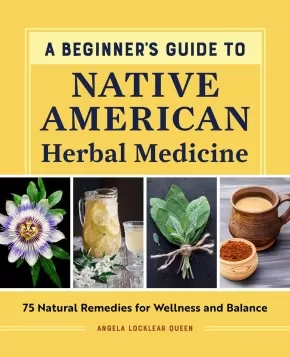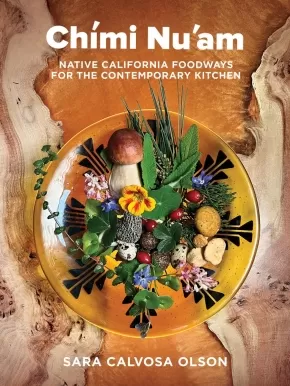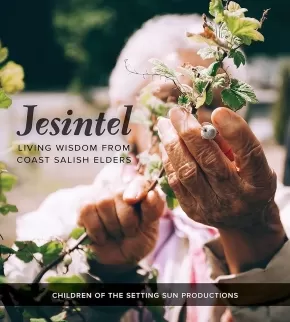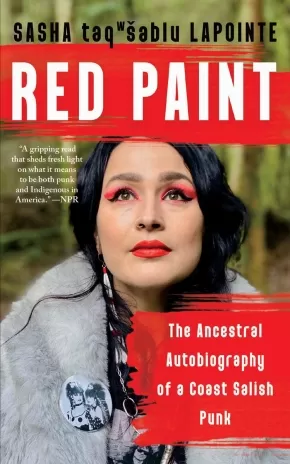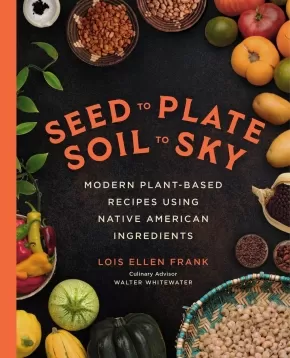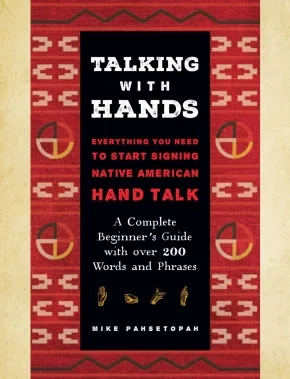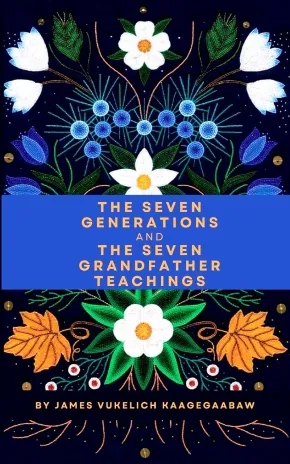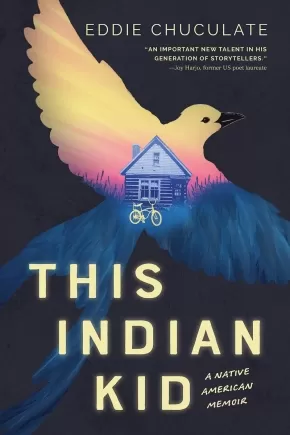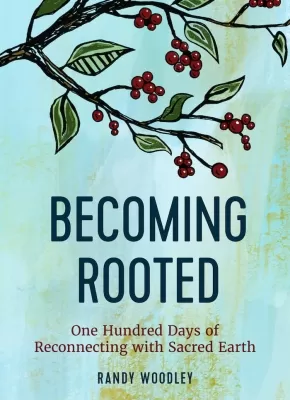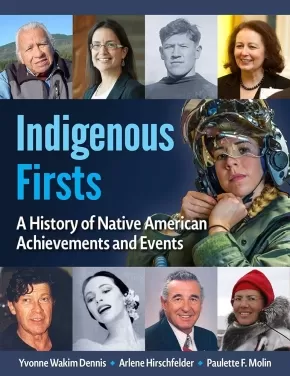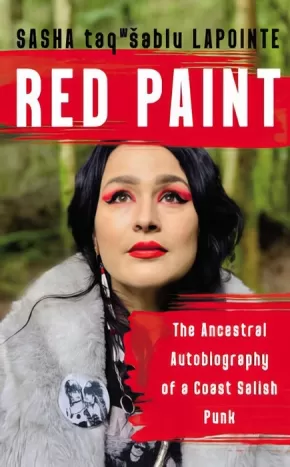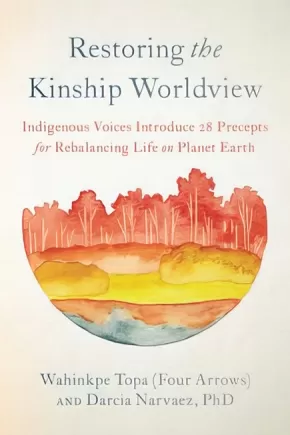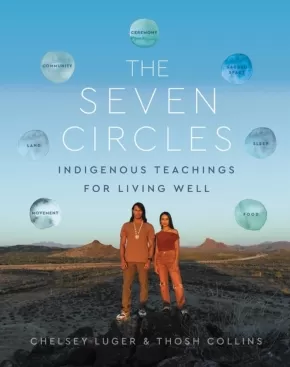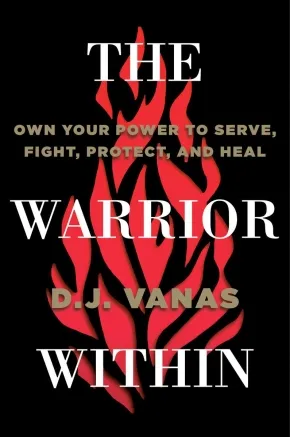
Native American
16
-
30
of
50 Results;
Sort By
Go To
of 4
A Beginner's Guide to Native American Herbal Medicine: 75 Natural Remedies for Wellness and Balance
$25.99
Format:
Paperback
Text Content Territories:
Indigenous American; Native American;
Reading Level: N/A
ISBN / Barcode: 9798886501278
Synopsis:
Synopsis:
Improve your well-being with Native American herbal medicine
Native American herbal medicine offers a powerful way to connect with the earth and heal naturally—and with this handbook of Native American herbs, you can learn all about herb uses and their restorative effects. Written by an Indigenous herbalist, this guide shows you how to responsibly use traditional plants to treat anxiety, colds, inflammation, and more.
This standout among books about herbs and healing will help you:
- Learn about a time-honored practice—Discover the origins and healing secrets of Native American herbalism, its traditional and modern uses, and how tools like the medicine wheel teach us about our relationship with the natural world.
- Identify the essential herbs—Explore the healing properties of medicinal herbs for wellness, from anise hyssop to yerba santa.
- Make 75 natural remedies—Ease physical and emotional ailments with Native American remedies, like Memory Support Tea, Stress-Induced Headache Tincture, and Antibacterial Healing Herb Liniment.
Tap into traditional wisdom with this Native American herbal medicine book for health and well-being.
Reviews
"A beautiful jumping-off point for anyone who is interested in practical herbalism. Angela organizes the wisdom of Native American herbalism in a way that is accessible for anyone to pick up and fold into their everyday life." —Kathleen Lee, acupuncturist, herbalist, and spiritual business mentor
"Angela is a wise and fierce protector of plant medicine and traditions of healing. Her first book, A Beginner's Guide to Native American Herbal Medicine, is a meaningful, accessible resource for readers who seek to ground themselves in understanding and build an herbal practice of integrity." —Graham Wesley
Additional Information
165 pages | 7.50" x 9.25" | full-colour photographs throughout | Paperback
Chimi Nu'am: Native California Foodways for the Contemporary Kitchen
$62.50
Format:
Hardcover
Text Content Territories:
Indigenous American; Native American; Karuk;
ISBN / Barcode: 9781597146159
Synopsis:
Synopsis:
More than seventy delectable recipes that bring California’s Indigenous cuisines into kitchens today.
In this sumptuous cookbook, Sara Calvosa Olson (Karuk) reimagines some of the oldest foods in California for home cooks today. Meaning “Let’s eat!” in the Karuk language, Chími Nu’am shares the author’s delicious and inventive takes on Native food styles from across California. Over seventy seasonal recipes centered on a rich array of Indigenous ingredients follow the year from Fall (elk chili beans, acorn crepes) to Winter (wild boar pozole, huckleberry hand pies) to Spring (wildflower spring rolls, peppernut mole chicken) to Summer (blackberry braised smoked salmon, acorn milk freezer pops). Special sections offer guidance on acorn preparation, traditional uses of proteins, and mindful ingredient sourcing. Calvosa Olson has spent many years connecting her family’s foodways with a growing community, and these recipes, techniques, and insights invite everyone to Calvosa Olson’s table. Designed as an accessible entry for people beginning their journey toward a decolonized diet, Chími Nu’am welcomes readers in with Calvosa Olson’s politically attuned and irresistibly funny writing. With more than 100 photographs, this cookbook is a culinary gift that will add warmth and mouthwatering aromas to any kitchen.
Reviews
"This cookbook designed to uplift Indigenous California foods will delight foragers, adventurous home cooks, and those looking to connect with Native roots. It's a valuable addition to library shelves that will connect Native and non-Native Americans to the earth and its abundant gift of ingredients." —Library Journal
"With Chími Nu'am, Olson looks to encourage people to start thinking about a decolonized diet, connecting to the land and native ingredients prior to European colonization [... and] aims to make Indigenous ingredients and traditional Karuk recipes accessible to a whole range of home cooks." —Nina Friend, BBC World's Table
"Chími Nu’am is serious about taking a holistic view of reintegrating the healthfulness of traditional diets into modern lives, benefiting both personal well-being and the greater good." —Naomi Tomky, Atlas Obscura
"Calvosa Olson has written a book that will speak to multiple audiences. But whether she's guiding Indigenous readers to embrace more of their cultural foods or making recommendations for non-Indigenous readers interested in decolonizing their diets in an ethical way (hint: it's about reciprocity), her voice and philosophy come through clearly on the page." —Twilight Greenaway, Civil Eats
"To say that Chími Nu'am is just a cookbook is inaccurate. What took Calvosa Olson more than two years to write and publish is an expression of her life and an act of stewardship for the earth. [...] The author was raised to believe that if you take care of the land, the land will take care of you." —Prism
"Calvosa Olson invites readers to forage for and become more attuned to Indigenous and seasonal ingredients—nurturing a deeper connection to place and enhancing one’s role as an environmental steward." —Uprooted
"Connecting with nature is an approach to cooking that is often overlooked—but not for Sara Calvosa Olson. A native Californian raised by a Karuk mother, she is leading people on a path to decolonize their diets, one cup of manzanita flour at a time." —KCRW Good Food
"Connection to people and planet is central to both Calvosa Olson's personal approach to food as well as the message of Chími Nu'am." —Rachel Askinasi, The Messenger
"Besides being a creative, accessible cookbook, Calvosa Olson's work is a call for stewardship of the environment and an introduction to some local foods that have long been part of Native diets. It’s a terrific resource for foragers, teachers, libraries, classrooms, cooks, and anyone looking to learn more about the foodways of California's Indigenous peoples." —Edible East Bay
Additional Information
288 pages | 7.50" x 10.00" | Hardcover
Ira Hayes: The Akimel O'odham Warrior, World War II, and the Price of Heroism
$38.00
Format:
Hardcover
Text Content Territories:
Indigenous American; Native American; Pima (Akimel O'odham);
Grade Levels: 12; University/College;
ISBN / Barcode: 9781538709504
Synopsis:
Synopsis:
The gripping, forgotten tale of Ira Hayes—a Native American icon and World War II legend who famously helped raise the flag at Iwo Jima but spent the latter half of his life haunted by being a war hero.
IRA HAYES tells the story of Ira Hamilton Hayes from the perspective of a Native American combat veteran of the Vietnam generation. Hayes, along with five other Marines, was captured in Joe Rosenthal’s iconic photograph of raising the stars and stripes on Mount Suribachi during the battle for the Japanese Island of Iwo Jima. The photograph was the inspiration and model for the U.S. Marine Corps War Memorial in Arlington.
Between the time he helped raise that flag and his death—and beyond—he was the subject of more newspaper columns than any other Native person. He was hailed as a hero and maligned as a chronic alcoholic unable to take care of himself. IRA HAYES explores these fluctuating views of Ira Hayes. It reveals that they were primarily the product of American misconceptions about Native people, the nature of combat, and even alcoholism. Like most surviving veterans of combat, Ira did not think of himself as a heroic figure. There can be no doubt that Ira suffered from PTSD, which is a compound of survivor’s guilt, the shock of seeing death, especially of one’s friends, and the isolation brought on by feeling that no one could understand what he had been through. Ira’s life has been a subject of two motion pictures and a television drama. All these dramas sympathize with him, but ultimately fail to see his binge drinking as his way of temporarily escaping the melancholy, the rage he felt, his sense of betrayal, and the sheer boredom of peacetime.
IRA HAYES breaks apart the complexities of Ira’s short life in honor of all Native veterans who have been to war in the service of the United States. This is equally their story.
Reviews
"Written with page-turning excitement, Tom Holm, a Native scholar and veteran of Vietnam, offers an Indigenous realism through the heroic life of Ira Hayes, an Akimel O’odam marine in World War II. You will re-live the life of Ira Hayes who helped to raise the American flag at Iwo Jima after the bloodiest battle in Pacific during the war and became a legend. A gifted storyteller, Holm writes with an engaging insight making the reader feel right beside Ira Hayes in boarding school, combat, and struggling with PTSD."—Donald L. Fixico (Muscogee, Seminole, Shawnee and Sac and Fox), Regents’ and Distinguished Foundation Professor of History, Arizona State University
“WWII hero Ira Hayes would have appreciated this book. Author Tom Holm uses Ira’s courage and humility as tools to dissect the historic and current fate of his Native American people. And Ira’s challenges focus light upon the tragedy of war and the horrors of PTSD. A meaningful and beautifully-researched read.”—Judy Avila, bestselling author of Code Talker: The First and Only Memoir by One of the Original Navajo Code Talkers of WWII
“Tom Holm brilliantly and respectfully offers readers a rich and long overdue account of the life and tragic death of Ira Hayes that pierces through the stereotypes and misconceptions that plagued his during his life and long after his passing. It is a sensitive work that reminds us of the enormous emotional, psychological, and cultural difficulties Hayes had to cope with throughout his life. It is a splendid and timely contribution.” —Dr. David Wilkins, E. Claiborne Robins Distinguished Professor in Leadership Studies and citizen of the Lumbee Nation of North Carolina
“As a historian and a veteran, Tom Holm is uniquely positioned to write this important story, the first scholarly treatment of Hayes' life and times. Holm examines Hayes' struggles with fame and illness after World War II while offering insights into a post-war America hostile to Native identity and sovereignty despite the sacrifices made by Hayes and thousands of other Native Americans.”—Paul C. Rosier, Ph.D., Professor of History at Villanova University and author of Serving Their Country: American Indian Politics and Patriotism in the Twentieth Century
"An excellent piece of scholarship; the definitive work on this Native American veteran. Carefully nuanced and rich in context, Holm transcends and dispels the stereotypes of Ira Haye’s life to show the complexity of the Akimel O’odham experience, the impacts of World War II, the social use of alcohol in 1940s America, and his personal experiences from poverty, racism, and the unwanted and unending attention following the flag raising on Mount Suribachi. As Holm concludes, 'He should be remembered for who he was rather that for what the dominant society has been led to believe about him.'"—William C. Meadows, Missouri State University
"Tom Holm deservedly looms large in the history of Indigenous peoples’ military service in the wars of the twentieth century. In his new book, IRA HAYES, Holm reintroduces us to the iconic individual in ‘The Photograph’ of the flag-raising on Mount Suribachi. Holm extricates Hayes from the trope of tragedy and the racist stereotype of the ‘drunken Indian’ into which his story was confined during his lifetime and in which it remained trapped since his death. Instead, a complex Ira Hayes comes to life in the long context of his Akimel O’odham culture and community, American colonialism and racism, his military service, and his likely suffering from Post-Traumatic Stress Disorder. This tour de force is, by turns, compelling, devastating, and intensely humanizing."—R. Scott Sheffield, Professor of History at University of the Fraser Valley and co-author of Indigenous Peoples and the Second World War: The Politics, Experiences and Legacies of War in the US, Canada, Australia and New Zealand
“A strong contribution to the literature of World War II, Native American warriors, and the unseen wounds of war.”—Kirkus Reviews
Additional Information
320 pages | 6.35" x 9.25" | Hardcover
Jesintel: Living Wisdom from Coast Salish Elders
$48.00
Artists:
Format:
Paperback
Text Content Territories:
Indigenous Canadian; First Nations; Salish; Coast Salish; Sto:lo; Saanich (WSANEC); Tsartlip; Musqueam; Malahat; Cowichan; Tsleil-Waututh; Indigenous American; Native American; Salish; Coast Salish; Tulalip; Swinomish; Snoqualmie; Nisqually; Muckleshoot; Lhaq'temish (Lummi Nation); Klallam (Clallam); Jamestown S'Klallam;
Grade Levels: 12; University/College;
ISBN / Barcode: 9780295748641
Synopsis:
Synopsis:
“We need to learn and grow together, and if we are able to do this, we will create harmony,” counsels Tom Sampson, an elder of Tsartlip First Nation in British Columbia.
Dynamic and diverse, Coast Salish culture is bound together by shared values and relations that generate a resilient worldview. Jesintel—"to learn and grow together"—characterizes the spirit of this book, which brings the cultural teachings of nineteen elders to new generations.
Featuring interviews that share powerful experiences and stories, Jesintel illuminates the importance of ethical reciprocal relationships and the interconnectedness of places, land, water, and the spirit within all things. Elders offer their perspectives on language revitalization, Coast Salish family values and naming practices, salmon, sovereignty, canoe racing, and storytelling. They also share traumatic memories, including of their boarding school experiences and the epidemics that ravished their communities. Jesintel highlights the importance of maintaining relations and traditions in the face of ongoing struggles. Collaboration is at the heart of this work and informs how the editors and community came together to honor the boundless relations of Coast Salish people and their territories.
Elders Interviewed:
Tom Sampson (Tsartlip First Nation)
Virginia Cross (Muckleshoot Tribe)
Ernestine Gensaw (Lummi Nation)
Steve and Gwen Point (Stó:lō Nation)
Gene and Wendy Harry (Malahat Nation)
Claude Wilbur (Swinomish Tribe)
Richard Solomon (Lummi Nation)
Elaine Grinell (Jamestown S’Klallam Tribe)
Arvid Charlie (Cowichan Nation)
Amy George (Tsleil-Waututh Nation)
Nancy Shippentower (Nisqually Tribe)
Nolan Charles (Musqueam Indian Band)
Andy de los Angeles (Snoqualmie Tribe)
Jewell James (Lummi Nation)
Kenny Moses Sr. Family (Tulalip Tribal Nation)
Ramona Morris (Lummi Nation)
Reviews
"A beautiful sharing of thriving Coast Salish communities. Indigenous elders, cultures, and languages have so much precious wisdom to share, and Jesintel celebrates these through storytelling and photos. It is a generous gift to anyone who wants to better understand the resilience of Indigenous communities."- Michelle M. Jacob (Yakama), author of The Auntie Way: Stories Celebrating Kindness, Fierceness, and Creativity
Educator Information
Nineteen elders from Coast Salish communities in the Pacific Northwest and British Columbia offer a portrait of their perspectives on language, revitalization, and Coast Salish family values. Topics include naming practices, salmon, canoe journeys and storytelling.
Additional Information
224 pages | 9.00" x 10.00" | 144 colour illustrations | 1 map | Paperback
Red Paint: The Ancestral Autobiography of a Coast Salish Punk (PB)
$23.00
Format:
Paperback
Text Content Territories:
Indigenous American; Native American; Salish; Coast Salish; Nooksack; Upper Skagit;
ISBN / Barcode: 9781640095885
Synopsis:
Synopsis:
An Indigenous artist blends the aesthetics of punk rock with the traditional spiritual practices of the women in her lineage in this bold, contemporary journey to reclaim her heritage and unleash her power and voice while searching for a permanent home.
Sasha taqʷšəblu LaPointe has always longed for a sense of home. When she was a child, her family moved around frequently, often staying in barely habitable church attics and trailers, dangerous places for young Sasha.
With little more to guide her than a passion for the thriving punk scene of the Pacific Northwest and a desire to live up to the responsibility of being the namesake of her beloved great-grandmother—a linguist who helped preserve her Indigenous language of Lushootseed—Sasha throws herself headlong into the world, determined to build a better future for herself and her people.
Set against a backdrop of the breathtaking beauty of Coast Salish ancestral land and imbued with the universal spirit of punk, Red Paint is ultimately a story of the ways we learn to find our true selves while fighting for our right to claim a place of our own.
Examining what it means to be vulnerable in love and in art, Sasha offers up an unblinking reckoning with personal traumas amplified by the collective historical traumas of colonialism and genocide that continue to haunt native peoples. Red Paint is an intersectional autobiography of lineage, resilience, and, above all, the ability to heal.
Awards
- Winner of the 2023 Pacific Northwest Book Award
Reviews
"Red Paint is a miraculous book. Sasha LaPointe walks us through the sites of her evisceration while rebuilding a home within her body using sturdy materials: rose quartz, cedar bark, red clay, and the words of her ancestors. With each potent sentence, she shows us what access to power looks like. She shows us how to become whole.” —Elissa Washuta, author of White Magic
"As luminous as the morning sun over the fir forests, Red Paint is a story of where strength takes us. Sasha taqwšəblu LaPointe goes looking to the past to help heal from terrible traumas, finding inspiration in her ancestors, the Salish people. This is a book destined to be a classic. Read it." —Rene Denfeld, bestselling author of The Child Finder
Additional Information
240 pages | 5.01" x 8.00" | Paperback
Seed to Plate, Soil to Sky: Modern Plant-Based Recipes Using Native American Ingredients
$38.00
Format:
Hardcover
Text Content Territories:
Indigenous American; Native American;
ISBN / Barcode: 9780306827297
Synopsis:
Synopsis:
This enriching cookbook celebrates eight important plants Native Americans introduced to the rest of the world: corn, beans, squash, chile, tomato, potato, vanilla, and cacao—with more than 100 recipes. When these eight Native American plants crossed the ocean after 1492, the world’s cuisines were changed forever. In Seed to Plate, Soil to Sky, James Beard Award-winning author and chef Lois Ellen Frank introduces the splendor and importance of this Native culinary history and pairs it with delicious, modern, plant-based recipes using Native American ingredients. Along with Native American culinary advisor Walter Whitewater, Seed to Plate, Soil to Sky shares more than 100 nutritious, plant‑based recipes organized by each of the foundational ingredients in Native American cuisine as well as a necessary discussion of food sovereignty and sustainability.
A delicious, enlightening celebration of Indigenous foods and Southwestern flavors, Seed to Plate, Soil to Sky shares recipes for dishes such as Blue Corn Hotcakes with Prickly Pear Syrup, Three Sisters Stew, and Green Chile Enchilada Lasagna, as well as essential basics like Corn Masa, Red and Green Chile Sauces, and Cacao Spice Rub. The “Magic 8” ingredients share the page—and plate—to create recipes that will transform your world.
Reviews
"Seed to Plate honors the practical side of growing Indigenous heirloom seeds to fruition. Lois demonstrates how to respect the whole life cycle of these foods by processing and cooking them with reverence, so when they end up on our plate and in our bellies, they are true medicine. This book honors Native American food wisdom and transforms the way we think about daily nourishment.” —from the foreword by Melissa K. Nelson, (Anishinaabe/Métis [Turtle Mountain Chippewa]), Professor of Indigenous Sustainability, Arizona State University; President of the Cultural Conservancy"
"Seed to Plate, Soil to Sky is more than a beautiful and empowering book. It is a landmark in the culinary world, helping us remember timeless traditions and put them to use at a time when healthful traditions are needed most. It is a treasury of historical context, key botanical information, and practical tips for the kitchen that will allow us to use the bounty of nature for health and vitality."—Neal D. Barnard, MD, FACC, adjunct professor of medicine, George Washington Univ. School of Medicine & Health Sciences, president, Physicians Committee for Responsible Medicine
Additional Information
320 pages | 7.60" x 9.40" | 75 full colour photos | Hardcover
Talking with Hands: Everything You Need to Start Signing Native American Hand Talk - A Complete Beginner's Guide with over 200 Words and Phrases
$32.99
Format:
Paperback
Text Content Territories:
Indigenous American; Native American;
Reading Level: N/A
ISBN / Barcode: 9781577153665
Synopsis:
Synopsis:
Explore Native American culture and learn Hand Talk, also known as Plains Indian Sign Language, Plains Sign Talk, and First Nation Sign Language.
In Talking with Hands, professional Native American dancer, storyteller, and educator Mike Pahsetopah reveals the beauty of Plains Indian Sign Language, which was once used as a common language between the Indigenous peoples of the region now generally known as the Great Plains of North America. The language was used for trade, but also for storytelling and by the Deaf community, making it a very common and useful tool in society. Today, only a few native speakers remain.
This beautifully designed book makes practicing Plains Indian Sign Language easy and engaging. Learn the proper positions and motions of this now-rare language with photos and descriptions throughout the pages. Follow along with diagrams to perfect your abilities.
Learn how to use your hands to convey the meanings of over 200 common words. In this detailed guide, you will learn to sign words like:
- Hungry
- Camp
- Evening
- Angry
- Fire
- Owl
- Together
- Brave
- And more
Honor and carry on the culture of the Plains peoples by learning the sign language they shared.
Additional Information
168 pages | 8.30" x 10.35" | 100+ color photos | Paperback
The Seven Generations and The Seven Grandfather Teachings
$18.50
Format:
Paperback
Text Content Territories:
Indigenous American; Native American; Anishinaabeg; Ojibwe (Chippewa);
Reading Level: N/A
ISBN / Barcode: 9798988531302
Synopsis:
Synopsis:
Discover the profound wisdom of the Anishinaabe/Ojibwe people in The Seven Generations and The Seven Grandfather Teachings. In this captivating journey, you will immerse yourself in timeless teachings that illuminate the way to interconnectedness and interdependence. As the spiritual translation of the sacred laws, the Seven Grandfather teachings guide us towards Mino-bimaadiziwin, 'the good life' - a life of harmony, free from contradiction or conflict. Prepare to embark on a transformative path of peace and balance, where ancestral knowledge offers invaluable lessons for a fulfilling existence.
Additional Information
90 pages | 5.00" x 8.00" | Paperback
This Indian Kid: A Native American Memoir
$26.99
Format:
Hardcover
Text Content Territories:
Indigenous American; Native American; Muscogee (Creek);
ISBN / Barcode: 9781338802085
Synopsis:
Synopsis:
Award-winning author Eddie Chuculate recounts his experience growing up in rural Oklahoma, from boyhood to young manhood, in an evocative and vivid voice.
These books help readers learn about the world in which they live and develop their critical thinking skills so that they may become dynamic citizens who are able to analyze and understand our past, participate in essential discussions about our present, and work to grow and build our future.
"Granny was full-blooded Creek, but the Bureau of Indian Affairs insisted she was fifteen-sixteenths. She showed her card to me. I’d sit at the kitchen table and stare at her when she was eating, wondering how you can be a sixteenth of anything."
Growing up impoverished and shuttled between different households, it seemed life was bound to take a certain path for Eddie Chuculate. Despite the challenges he faced, his upbringing was rich with love and bountiful lessons from his Creek and Cherokee heritage, deep-rooted traditions he embraced even as he learned to live within the culture of white, small-town America that dominated his migratory childhood.
Award-winning author Eddie Chuculate brings his childhood to life with spare, unflinching prose. This book is at once a love letter to his Native American roots and an inspiring and essential message for young readers everywhere, who are coming of age in an era when conversations about acceptance and empathy, love and perspective are more necessary than ever before.
Educator Information
For ages 12+
This book is part of Scholastic Focus, the premier home of thoroughly researched, beautifully written, and thoughtfully designed works of narrative nonfiction aimed at middle-grade and young adult readers.
Additional Information
240 pages | 5.50" x 8.25" | Hardcover
Becoming Rooted: One Hundred Days of Reconnecting with Sacred Earth
$29.99
Format:
Hardcover
Text Content Territories:
Indigenous American; Native American; Cherokee; United Keetoowah Band ;
Reading Level: N/A
ISBN / Barcode: 9781506471174
Synopsis:
Synopsis:
What does it mean to become rooted in the land? How can we become better relatives to our greatest teacher, the Earth? Becoming Rooted invites us to live out a deeply spiritual relationship with the whole community of creation and with Creator.
Through meditations and ideas for reflection and action, Randy Woodley, an activist, author, scholar, and Cherokee descendant, recognized by the Keetoowah Band, guides us on a one-hundred-day journey to reconnect with the Earth. Woodley invites us to come away from the American dream--otherwise known as an Indigenous nightmare--and get in touch with the water, land, plants, and creatures around us, with the people who lived on that land for thousands of years prior to Europeans' arrival, and with ourselves. In walking toward the harmony way, we honor balance, wholeness, and connection.
Creation is always teaching us. Our task is to look, and to listen, and to live well. She is teaching us now.
"This journey is your personal invitation into a different kind of relationship with nature—or, as I like to say, with the whole community of creation. It is also an invitation into a different kind of relationship with Creator, however you understand Creator to be present in your own life and within everything—as God, as Great Mystery, as a higher power, or as the universe." - Randy Woodley
Reviews
“Randy Woodley reminds us that we all have an understanding of what it means to be indigenous to a spiritual place. Through slowly unfolding layers of meaning, he shows us where we may discover that place for ourselves.”—Steven Charleston, elder of the Choctaw Nation of Oklahoma
“Becoming Rooted offers us a precious way back into the land: a way into restoration and reciprocity, a way into healing ourselves and the land, a way of belonging again, a way of finding out who we are. Randy Woodley takes us by the hand and walks with us for the first one hundred days. We begin to think and feel differently, our senses gain new direction, and we start to gain roots. I am so grateful for this book and for the life and work of Randy Woodley.”— Cláudio Carvalhaes, associate professor of worship, Union Theological Seminary
“Becoming Rooted draws you deeper into relationship with the land where you live. Few of us live in the place we were born, but these reflections take you past that disconnection and help you notice the world around you in new ways.”—Patty Krawec, Anishnaabe author and co-host of the Medicine for the Resistance podcast
Educator Information
Includes meditations, reflections, and action items for 100 days.
Additional Information
256 pages | 5.20" x 7.10" | Hardcover
Indigenous Firsts: A History of Native American Achievements and Events
$50.95
Format:
Paperback
Text Content Territories:
Indigenous American; Alaska Native; Native American;
ISBN / Barcode: 9781578597123
Synopsis:
Synopsis:
A celebration of achievement, accomplishments, and courage!
Native American Medal of Honor recipients, Heisman Trophy recipients, U.S. Olympians, a U.S. vice president, Congressional representatives, NASA astronauts, Pulitzer Prize recipients, U.S. poet laureates, Oscar winners, and more. The first Native magician, all-Native comedy show, architects, attorneys, bloggers, chefs, cartoonists, psychologists, religious leaders, filmmakers, educators, physicians, code talkers, and inventors. Luminaries like Jim Thorpe, King Kamehameha, Debra Haaland, and Will Rogers, along with less familiar notables such as Native Hawaiian language professor and radio host Larry Lindsey Kimura and Cree/Mohawk forensic pathologist Dr. Kona Williams. Their stories plus the stories of 2000 people, events and places are presented in Indigenous Firsts: A History of Native American Achievements and Events, including:
- Suzanne Van Cooten, Ph.D., Chickasaw Nation, the first Native female meteorologist in the country
- Caleb Cheeshahteaumuck, Wampanoag from Martha’s Vineyard, graduate of Harvard College in 1665
- Debra Haaland, the Pueblo of Laguna, U.S. Congresswoman and Secretary of the Interior
- Sam Campos, the Native Hawaiian who developed the Hawaiian superhero Pineapple Man
- Thomas L. Sloan, Omaha, was the first Native American to argue a case before the U.S. Supreme Court
- William R. Pogue, Choctaw, astronaut
- Johnston Murray, Chickasaw, the first person of Native American descent to be elected governor in the United States, holding the office in Oklahoma from 1951 to 1955
- The Cherokee Phoenix published its first edition February 21, 1828, making it the first tribal newspaper in North America and the first to be published in an Indigenous language
- The National Native American Honor Society was founded by acclaimed geneticist Dr. Frank C. Dukepoo , the first Hopi to earn a Ph.D.
- Louis Sockalexis, Penobscot, became the first Native American in the National Baseball League in 1897 as an outfielder with the Cleveland Spiders
- Jock Soto, Navajo/Puerto Rican, the youngest-ever man to be the principal dancer with the New York City Ballet
- The Seminole Tribe of Florida was the first Nation to own and operate an airplane manufacturing company
- Warrior's Circle of Honor, the National Native American Veterans Memorial in Washington, DC, on the grounds of the Smithsonian’s National Museum of the American Indian
- The Iolani Palace, constructed 1879–1882, the home of the Hawaiian royal family in Honolulu
- Loriene Roy, Anishinaabe, White Earth Nation, professor at the University of Texas at Austin’s School of Information, former president of the American Library Association
- Ben Nighthorse Campbell, Northern Cheyenne, U.S. representative and U.S. senator from Colorado
- Hanay Geiogamah, Kiowa /Delaware, founded the American Indian Theatre Ensemble
- Gerald Vizenor, White Earth Nation, writer, literary critic, and journalist for the Minneapolis Tribune
- Ely S. Parker (Hasanoanda, later Donehogawa), Tonawanda Seneca, lieutenant colonel in the Union Army, serving as General Ulysses S. Grant’s military secretary
- Fritz Scholder, Luiseno, painter inducted into the California Hall of Fame
- The Native American Women Warriors, the first all Native American female color guard
- Lori Arviso Alvord, the first Navajo woman to become a board-certified surgeon
- Kay “Kaibah” C. Bennett, Navajo, teacher, author, and the first woman to run for the presidency of the Navajo Nation
- Sandra Sunrising Osawa, Makah Indian Nation, the first Native American to have a series on commercial television
- The Choctaw people’s 1847 donation to aid the Irish people suffering from the great famine
- Otakuye Conroy-Ben, Oglala Lakota, first to earn an environmental engineering Ph.D. at the University of Arizona
- Diane J. Willis, Kiowa, former President of the Society of Pediatric Psychology and founding editor of the Journal of Pediatric Psychology
- Shelly Niro, Mohawk, winner of Canada’s top photography prize, the Scotiabank Photography Award
- Loren Leman, Alutiiq/Russian-Polish, was the first Alaska Native elected lieutenant governor
- Kim TallBear, Sisseton-Wahpeton Oyate, the first recipient of the Canada Research Chair in Indigenous Peoples, Technoscience, and Environment
- Carissa Moore, Native Hawaiian, won the Gold Medal in Surfing at the 2020 Tokyo Olympics
- Will Rogers, Cherokee, actor, performer, humorist was named the first honorary mayor of Beverly Hills
Foods of the Southwest Indian Nations by Lois Ellen Frank, Kiowa, was the first Native American cookbook to win the James Beard Award - Diane Humetewa, Hopi, nominated by President Barack Obama, became the first Native American woman to serve as a federal judge
- Susie Walking Bear Yellowtail, Crow, the first Native American nurse to be inducted into the American Nursing Association Hall of Fame
Indigenous Firsts honors the ongoing and rich history of personal victories and triumphs, and with more than 200 photos and illustrations, this information-rich book also includes a helpful bibliography and an extensive index, adding to its usefulness. This vital collection will appeal to anyone interested in America’s amazing history and its resilient and skilled Indigenous people.
Additional Information
496 pages | 7.19" x 9.18" | Paperback
Red Paint: The Ancestral Autobiography of a Coast Salish Punk (HC) (1 in Stock)
$33.00
Format:
Hardcover
Text Content Territories:
Indigenous American; Native American; Salish; Coast Salish; Nooksack; Upper Skagit;
Grade Levels: 12; University/College;
ISBN / Barcode: 9781640094147
Synopsis:
Synopsis:
An Indigenous artist blends the aesthetics of punk rock with the traditional spiritual practices of the women in her lineage in this bold, contemporary journey to reclaim her heritage and unleash her power and voice while searching for a permanent home.
Sasha taqʷšəblu LaPointe has always longed for a sense of home. When she was a child, her family moved around frequently, often staying in barely habitable church attics and trailers, dangerous places for young Sasha.
With little more to guide her than a passion for the thriving punk scene of the Pacific Northwest and a desire to live up to the responsibility of being the namesake of her beloved great-grandmother—a linguist who helped preserve her Indigenous language of Lushootseed—Sasha throws herself headlong into the world, determined to build a better future for herself and her people.
Set against a backdrop of the breathtaking beauty of Coast Salish ancestral land and imbued with the universal spirit of punk, Red Paint is ultimately a story of the ways we learn to find our true selves while fighting for our right to claim a place of our own.
Examining what it means to be vulnerable in love and in art, Sasha offers up an unblinking reckoning with personal traumas amplified by the collective historical traumas of colonialism and genocide that continue to haunt native peoples. Red Paint is an intersectional autobiography of lineage, resilience, and, above all, the ability to heal.
Awards
- Winner of the 2023 Pacific Northwest Book Award
Reviews
"Red Paint is a miraculous book. Sasha LaPointe walks us through the sites of her evisceration while rebuilding a home within her body using sturdy materials: rose quartz, cedar bark, red clay, and the words of her ancestors. With each potent sentence, she shows us what access to power looks like. She shows us how to become whole.” —Elissa Washuta, author of White Magic
"As luminous as the morning sun over the fir forests, Red Paint is a story of where strength takes us. Sasha taqwšəblu LaPointe goes looking to the past to help heal from terrible traumas, finding inspiration in her ancestors, the Salish people. This is a book destined to be a classic. Read it." —Rene Denfeld, bestselling author of The Child Finder
Additional Information
240 pages | 5.31" x 8.29" | Hardcover
Restoring the Kinship Worldview: Indigenous Voices Introduce 28 Precepts for Rebalancing Life on Planet Earth
$28.95
Format:
Paperback
Text Content Territories:
Indigenous American; Native American; Indigenous;
Reading Level: N/A
ISBN / Barcode: 9781623176426
Synopsis:
Synopsis:
Selected speeches from Indigenous leaders around the world--necessary wisdom for our times, nourishment for our collective, and a path away from extinction toward a sustainable, interconnected future.
Indigenous worldviews, and the knowledge they confer, are critical for human survival and the wellbeing of future generations. Editors Wahinkpe Topa (Four Arrows) and Darcia Narvaez present 28 powerful excerpted passages from Indigenous leaders, including Mourning Dove, Robin Wall Kimmerer, Winona LaDuke, and Xiuhtezcatl Martinez. Accompanied by the editors’ own analyses, each chapter reflects the wisdom of Indigenous worldview precepts like:
• Egalitarian rule versus hierarchical governance
• A fearless trust in the universe, instead of a fear-based culture
• The life-sustaining role of ceremony
• Emphasizing generosity and the greater good instead of pursuing selfish goals and for personal gain
• The laws of nature as the highest rules for living
The editors emphasize our deep need to move away from the dominant Western paradigm--one that dictates we live without strong social purpose, fails to honor the earth as sacred, leads with the head while ignoring the heart, and places individual “rights” over collective responsibility. Restoring the Kinship Worldview is rooted in an Indigenous vision and strong social purpose that sees all life forms as sacred and sentient--that honors the wisdom of the heart, and grants equal standing to rights and responsibilities.
Inviting readers into a world-sense that expands beyond perceiving and conceiving to experiencing and being, Restoring the Kinship Worldview is a salve for our times, a nourishment for our collective, and a holistic orientation that will lead us away from extinction toward an integrated, sustainable future.
Reviews
“Humans have a particular ecological niche, a role as the custodial species of this earth. We must return our species to this niche within the next decade, or perish. This book is a perfect place to start—the foundation is good relations, making kin both human and nonhuman—and here we have story from a gathering of some of the finest Indigenous thinkers on the planet. Four Arrows and Darcia Narvaez have a particular way of bringing the right people together for such purposes.” —TYSON YUNKAPORTA, author of Sand Talk, senior research fellow at Deacon University, woodcarver, and poet
“Mahalo Four Arrows and Darcia Narvaez for this collection, this eloquence and grace through time so we can recognize and honor the common sense and purpose of continuity. All of it is needed now. We are all meant to wake up together.” —MANULANI ALULI MEYER, director of Indigenous education, University of Hawai‘i–West O‘ahu
“Darcia Narvaez and Four Arrows have gathered an inspiring pastiche of wise Native American voices woven together by their own insightful and heartfelt dialogues to gift us with an invaluable bundle of tenets and templates for the urgent project of decolonizing and rewilding our minds and communities.” —BILL PLOTKIN, PhD, author of Soulcraft, Wild Mind, and The Journey of Soul Initiation
Additional Information
336 pages | 6.00" x 8.95" | Paperback
The Seven Circles: Indigenous Teachings for Living Well
$36.99
Format:
Hardcover
Text Content Territories:
Indigenous American; Native American; Sioux; Pima (Akimel O'odham); Osage; Haudenosaunee (Iroquois); Seneca; Cayuga; Anishinaabeg; Ojibwe (Chippewa); Turtle Mountain Anishinaabe;
Grade Levels: 12; University/College;
ISBN / Barcode: 9780063119208
Synopsis:
Synopsis:
In this revolutionary self-help guide, two beloved Native American wellness activists offer wisdom for achieving spiritual, physical, and emotional wellbeing rooted in Indigenous ancestral knowledge.
When wellness teachers and husband-wife duo Chelsey Luger and Thosh Collins founded their Indigenous wellness initiative, Well for Culture, they extended an invitation to all to honor their whole self through Native wellness philosophies and practices. In reclaiming this ancient wisdom for health and wellbeing—drawing from traditions spanning multiple tribes—they developed the Seven Circles, a holistic model for modern living rooted in timeless teachings from their ancestors. Luger and Collins have introduced this universally adaptable template for living well to Ivy league universities and corporations like Nike, Adidas, and Google, and now make it available to everyone in this wise guide.
The Seven Circles model comprises interconnected circles that keep all aspects of our lives in balance, functioning in harmony with one another. They are:
- Food
- Movement
- Sleep
- Ceremony
- Sacred Space
- Land
- Community
In The Seven Circles, Luger and Collins share intimate stories from their life journeys growing up in tribal communities, from the Indigenous tradition of staying active and spiritually centered through running and dance, to the universal Indigenous emphasis on a light-filled, minimalist home to create sacred space. Along the way, Luger and Collins invite readers to both adapt these teachings to their lives as well as do so without appropriating and erasing the original context, representing a critical new ethos for the wellness space. Each chapter closes with practical advice on how to engage with the teachings, as well as wisdom for keeping that particular circle in harmony with the others.
With warmth and generosity—and 75 atmospheric photographs by Collins throughout—The Seven Circles teaches us how to connect with nature, with our community, and with ourselves, and to integrate ancient Indigenous philosophies of health and wellbeing into our own lives to find healing and balance.
Reviews
“A life-changing holistic guide to wellness rooted in empowerment, resiliency, and ‘good medicine.’ This book is for any human being searching for wellness solutions in a chaotic world, a true antidote to colonization.” — Vina Brown, Indigenous Scholar, Entrepreneur, Artist, and Professor of Indigenous Studies at Northwest Indian College
“The Seven Circles is a true innovation in Indigenous thought; it brings our shared heritage and traditional teachings to life. Truly inspiring. Readers will find their journey to be a motivating guide for self-transformation.” — Taiaiake Alfred, Mohawk Philosopher
“While the term ‘wellness’ has been co-opted and diluted by (primarily white) social media influencers in recent years, Luger and Collins are recentering the conversation around how to use Indigenous cultural values, foods, and modalities of movement as tools for spiritual, mental, physical, and emotional healing.” — Vanity Fair
“[Two of the] faces in the health and wellness scene that are pushing for inclusivity, justice, and kindness, toppling old conventions to make their own…Luger and Collins rewrite modern narratives regarding Native health while addressing complex histories and ongoing disparities.” — Outside magazine
“Spellbinding. This may be the first book I’ve ever read that made me stop and decide, “I’m making this change now!” Seven Circles opened my eyes to a way of life that is tested by time, guided by nature, and urgently needed today." — Christopher McDougall, author of Born to Run, Natural Born Heroes, and Running with Sherman
“Wisdom abounds in this stimulating offering.” — Publishers Weekly
“Luger and Collins provide a range of sensible, informed, accessible guidance for both small- and large-scale lifestyle changes. An appealing manual for healing the self through Indigenous traditions.” — Kirkus Reviews
Additional Information
256 pages | 7.00" x 9.00" | 75 Colour Photos | Hardcover
The Warrior Within: Own Your Power to Serve, Fight, Protect, and Heal
$39.00
Format:
Hardcover
Text Content Territories:
Indigenous American; Native American;
Reading Level: N/A
ISBN / Barcode: 9780593423011
Synopsis:
Synopsis:
A transformational guide to getting yourself right in order to accomplish the work you were meant to do, from speaker, former U.S. Air Force officer, and member of the Ottawa tribe D.J. Vanas.
When faced with an important job, and people depending on you to do it, most of us will give and give until there’s nothing left. But running on empty, even for a worthy cause, only sets you up for failure in the long run. To persevere on the path to success requires more than sheer fearlessness and willpower. It requires what D.J. Vanas calls the warrior spirit, the kind of strength that looks outward but comes from deep within.
Drawing inspiration from Native American philosophy and tradition, The Warrior Within outlines a new model for personal power in the face of overwhelming chaos. A true warrior is not the toughest or bravest person in the room. A true warrior is committed to self-mastery, knows how to navigate change and disruption, transforms setbacks into opportunities for achievement, refuses to quit, and most importantly, always fights for something bigger than the self. With a vast array of stories and examples, from vision quests to treacherous hikes to veterans and service providers at the front lines, Vanas shows how to apply these principles to transform how you show up both for yourself and those around you.
More than an empowerment manual, The Warrior Within is a call to accomplish the world-changing work you were meant for by tapping into the power of the warrior spirit.
Reviews
"The powerful lessons imparted in these chapters will inspire strength, confidence and motivation, so that you can deliver your best in the worst of circumstances—while keeping your sanity and health! I encourage every healthcare giver to read The Warrior Within, for they truly serve, fight, protect and heal every day, often at their own expense."--LeAnn Thieman, author of the Chicken Soup for Nurse’s Soul series and founder of SelfCare for HealthCare®
"I highly recommend The Warrior Within! Through great storytelling, D.J. Vanas shares an often overlooked element of leadership ... taking care of yourself. Our beautiful Anishinaabe teachings emphasize balance in all things. Being a warrior means recognizing your needs and honoring your gifts. Way to go, D.J.!"--Angeline Boulley (Sault Ste. Marie Tribe of Chippewa Indians) New York Times bestselling author of Firekeeper's Daughter
"D.J. Vanas inspires us to find our ‘warrior spirit’ of courage, perseverance, resilience, and teamwork in life’s most fearful times. Your heart will soar like an eagle as you read how ordinary heroes use this inner strength to serve others—and how we can learn to do the same.”--Joseph Pfeifer, FDNY Assistant Chief, retired, author of Ordinary Heroes
“This is it: the book I’ve been waiting for! There isn’t another on the market that applies indigenous principles and ideas in order to expose the warrior in you. A comprehensive, compelling, emotional and amazingly insightful book. I couldn’t put it down. I wish I had this book years ago!"--Juanita Mullen (Seneca), AI/AN Veterans Liaison, Department of Veterans Affairs
“DJ Vanas describes a life of leading and doing through Indigenous identity and values. Combining his personal story with advice, The Warrior Within is more than a leadership book. It is a story of living a life of abundance and rich relationships, with DJ as your terrific guide.”-Cheryl Crazy Bull, President & CEO, American Indian College Fund
Additional Information
256 pages | 5.72" x 8.57" | Hardcover
Sort By
Go To
of 4

